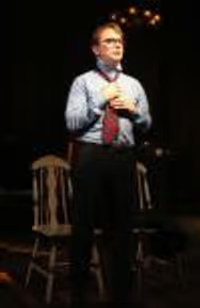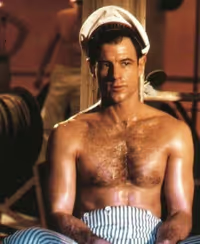Feminism vs. The Little Mermaid?
#1Feminism vs. The Little Mermaid?
Posted: 10/31/07 at 4:58am
I was watching the Broadway Beat video with interviews from the cast and crew of "The Little Mermaid" and was kind of surprised at Sherie Rene Scott's disdain for what she saw as a lack of resolve in the movie version for Ariel's mistake in giving her voice for a chance to reach her dream of being human and hooking up with Prince Eric. She states that the stage show beautifully corrects this by making Ariel much stronger and never willing to "sink so low to reach so high" again.
It is a completely valid interpretation, but one that never crossed my mind as a "problem" with the Disney film or the tragic Anderson tale. I for one don't need the protagonist of a story to be making politically correct statements. I say, let them be a little flawed.
I haven't seen the stage show yet, so Sherie could be right...it could be a much more beautiful ending. I just hope that the character doesn't get too "preachy"
#2re: Feminism vs. The Little Mermaid?
Posted: 10/31/07 at 11:01am
I agree. I actually think that there's a lot of Fairy Tale criticisim by adults - and actually those issues never even enter the child's mind. (i.e the idea of marrying a handsome prince and living "happily ever after" - as a child I never interpreted this as meaning that I needed a man to make me happy - but that the prince and castle were symbols for achieving your hearts desire.)
Actually one of the most beautiful moments in the movie to me is after Ursula has been killed, and Ariel (now a mermaid again) is sitting on the rock looking at prince Eric. The idea being, yes, making the deal with the Sea Witch was a bad move, but the bottom line is, without it she's still a mermaid. It's not like there was another option to become human. It's either make this horrible deal (which I don't believe Ariel EVER thought was a "good idea") or suck it up and stay a mermaid. But then - Triton makes her a human in the RIGHT way (and she's fully clothed this time!) The idea being that's what should have happened all along - but it couldn't until Triton (and Ariel) moved past what was keeping them apart.
I actually think it takes something away if this doesn't happen in the stage show - because then the message is that Ariel used the Sea Witch to become human - then kills her, but OH! She gets to stay a human. So the idea is she used the Sea Witch, not that she made a mistake.
What do you think?
#3re: Feminism vs. The Little Mermaid?
Posted: 10/31/07 at 12:43pm
"...actually those issues never even enter the child's mind... I never interpreted this as meaning that I needed a man to make me happy..."
Whether the child actually realizes it isn't the issue. The issue is the expectations and subconscious ideas that it causes to sink into a kid's psyche.
Same with something like Barbie and Bratz. Little girls don't "realize" that they're warping their outlook and self image. It's just happening...
I actually think that some of the charm of old fairy-tales and Disney movies lies in their old-school values and dated outlooks. They shouldn't be edited or revised; the ideal world would give kids options and ideas that balance them out.
#4re: Feminism vs. The Little Mermaid?
Posted: 10/31/07 at 4:21pm
So, what IS the new series of events in the stage show??
~JJJ
BDrischBDemented
Broadway Star Joined: 11/13/05
#5re: Feminism vs. The Little Mermaid?
Posted: 10/31/07 at 5:05pm
Ariel tells Eric to shove off and grow some fins if he wants this go any further.
Then she goes on to become the first female underwater mud wrestler. Mmm.
#7re: Feminism vs. The Little Mermaid?
Posted: 10/31/07 at 5:11pm
I totally understand what you mean about a child's subconcious. But again, that's not the message that sank in for me, and many of my friends. But I do agree about old fashioned values. Again, I think if you look into the roots of fairy tales in Celtic and Norse mythology - they are SYMBOLS - not the ultimate goal.
The "new" series of events are:
- Ariel trades her voice to Ursula for legs
-Ariel moves onto land and ends up staying with Prince Eric
-Eric teaches Ariel how to dance
-Eric can't get over the "girl with the voice" so he holds a contest to find the girl, which oubviously Ariel can't participate in.
- Ariel shows up at the contest and performs the dance steps Eric taught her. Eric realizes that he loves Ariel, despite the fact that she's "not the girl with the voice"
- Ursula shows up, gets upset, and Ariel (now full of girl power) smashes Ursula's shell getting her voice back and killing Ursula.
-They all live happily ever after.
#8re: Feminism vs. The Little Mermaid?
Posted: 10/31/07 at 5:17pm
Politically Correct?
Why do people throw this term around so haphazrdly?
The Disney version is a re-interpretation of the Andersen tale.
The stage version is re-interpretation of the Disney Film...
That is how story telling and re-telling is... it adjusts, it shifts, changes with each incarnation..
New tellers of the story find things they want to emphasize or re-work..
To describe changes soley as "politically correct" is thougtless.
#9re: Feminism vs. The Little Mermaid?
Posted: 10/31/07 at 5:22pm
children can understand that they're watching a movie and (or play) and just because the characters do something, does not mean the viewers will too. As a lover of Disney movies from the start I knew they were just MOVIES and at this point in time, it is clear to me that
a. A prince Charmiming would be nice, but,
b. I can be perfectly happy, if not better without one, or any man for that matter...
so, hows that for "expectations and subconscious ideas that it causes to sink into a kid's psyche."
colleen_lee
Broadway Legend Joined: 8/16/05
#10re: Feminism vs. The Little Mermaid?
Posted: 10/31/07 at 5:28pm
children can understand that they're watching a movie and (or play) and just because the characters do something, does not mean the viewers will too.
You are assuming way too much of the cognitive development of children. While most can distinguish the difference between real and pretend (as in, the cartoon movie is depicting pretend events) most are not able to process message on such a high level.
Children are affected by image and perception, greatly so. And girls who are exposed to the message that compromising self to please a man is an acceptable behavior will begin to manifest this.
I am not saying that we need to feminize every depiction of women in the media, but parents and educators do need to be responsible for exposing young girls to other images. That creates balanced children.
#11re: Feminism vs. The Little Mermaid?
Posted: 10/31/07 at 8:10pm
There is a difference between what a child sees when watching a disney move and what a parent sees. Most of the time the child sees a land that is not real and full of things that are fake. They also see it as a place that they themselves wish they could be in.
Parents see it as just thier kids having fun.
It is not uncommon for girls who are at a young age to just weant to be a disney princess and live that kind of life. This gets them to start caring about looks and has them just want to date the good looking guys and tart to hpe that they are good looking enough to attract the good looking guys.
#12re: Feminism vs. The Little Mermaid?
Posted: 11/1/07 at 7:53am
BigFatBlonde... while I certainly don't appreciate being called "thoughtless"..your more than free to form an opinion of me as I have now done so of you...
The FACT is Sherie Rene Scott was making a very feminist statement about the film & character. I NEVER said that I was closing my mind & not accepting a new take, but I find a that the latter Disney films in the 90's (particularly after Aladdin) felt like they were walking on too many political eggshells...particularly in the way they dealt with the female heroines. Agree or disagree, I feel that falls very much in the category of being too "politically correct" and am not throwing the term out there haphazardly.
If the stage show needs to shift and adjust to make it work better, than I'm fine with changes...as long as it is for the sole purpose of making the show as effective as can be and not "fixing" what is seen as a problem by political and/or feminist complaints.
colleen_lee
Broadway Legend Joined: 8/16/05
#13re: Feminism vs. The Little Mermaid?
Posted: 11/1/07 at 8:08am
What changes in female portrayal did you see post-Aladdin that made you uncomfortable? Any specifics?
Almost all creative forms are a relfection of the society they were created in. Updating "The Little Mermaid" in a way that reflects modern ideals is nothing more than adaptation. The original Andersen tale was very much a reflection of the society in which he was writing, and therefore stresses ideals which are no longer held in today's society.
The progression of the female heroine in children's film is a good example. There were few strong female figures in Disney prior to the mid 90s. Women were either delegated to the beautiful princess, or the evil witch. Notice that aesthetics also directly reflected internal character, a dangerous message to be sending to children.
#14re: Feminism vs. The Little Mermaid?
Posted: 11/1/07 at 8:35am
I disagree. The whole point of "Beauty and the Beast" is that it's what's on the inside that counts. (And by the way - I totally agree with BroadwayBenny.)
Read up on Fairy Tale analysis. Things are being represented as symbols. Not literals.
#15re: Feminism vs. The Little Mermaid?
Posted: 11/1/07 at 8:37am
colleen_lee ~
Personally I felt that characters like Pocahontas, Esmeralda & Mulan were a little too much on the preachy side. Not so much that I was uncomfortable, just that I think it felt a bit forced in trying to make them stronger and more independent. I am not knocking feminism in films and plays. I think it serves certain stories well. Meg in "Hercules" didn't feel at all forced to me, she was a well layered character who had a good reason for being so tough.
Again, I am fine with adapting and making changes, and if it'sjustshowbiz is correct and the changes don't make her preachy, than there is no problem for me. If Ariel has NATURALLY evolved into someone with a little more strength...that's awesome
you seem to take a very feminist stance on how the Disney films can send dangerous messages to young girls. I respect that opinion, but I don't share it. I think plenty of young girls were exposed to Snow White, Sleeping Beauty and Cinderella and were able to turn out as strong independent women and still able to enjoy these fairy tales for their entertainment value.
colleen_lee
Broadway Legend Joined: 8/16/05
#16re: Feminism vs. The Little Mermaid?
Posted: 11/1/07 at 9:35am
Read up on Fairy Tale analysis. Things are being represented as symbols. Not literals.
I actually took a literature course on fairy tales in college. Yes, much of the original tale IS symbolic, though the treatment of characters is, again an expression of the time in which they were written.
These fairy tales when being adapted into modern films are not being adapted as metaphor but as literal, and that is where a lot of the problem begins to fall. An allegory that represented the geo-political state of Germany in the 1850s is not going to read as such to a modern-day audience, let alone children, who take the stories as face value.
Personally I felt that characters like Pocahontas, Esmeralda & Mulan were a little too much on the preachy side.
Again, I'm wondering what SPECIFICALLY gave you a preachy vibe about these female characters?
The portrayals may have felt forced, they may have been forced, because there was a demand at that time (and continues to be) for female heroines more representative of the modern female.
I think plenty of young girls were exposed to Snow White, Sleeping Beauty and Cinderella and were able to turn out as strong independent women and still able to enjoy these fairy tales for their entertainment value.
I agree, and I never suggested otherwise. I stressed the importance of BALANCE. Children, especially young girls, should be exposed to these allegories, but these cannot be the only examples of women they see at this formative age. That is when it becomes dangerous.
I don't even have a particular problem with the Disney adaptations of Snow White, Sleeping Beauty, Cinderella, etc. because even these adaptations were a reflection on the society of the time. All of these films were released pre- women's movement in a time in which most women were dependent on men in order to survive, and where the majority of young women went straight from father to husband.
This is a different era and adaptations which reflect society as it exists today should be welcomed. Disney was struggling with that in the mid-90s, and that is why you see this sudden transition from passive heroine to active heroine during that time frame.
#17re: Feminism vs. The Little Mermaid?
Posted: 11/1/07 at 9:45am
I agree about the story naturally evolving. I always felt Ariel was very girl power, so it's not that I feel that her taking down the Sea Witch would be a against her character. I'm just worried about what is being lost if they keep the ending as is. I don't think adding girl power means you have to get rid of the Triton/Ariel relationship at the end for example.
Also, just on a pratical note, I've heard that the way Ursula is distroyed - with the shell being smashed is very anti climatic no matter who's doing the smashing.
theminutepast
Broadway Star Joined: 2/1/06
#18re: Feminism vs. The Little Mermaid?
Posted: 11/1/07 at 2:50pm
Yes, but in the Triton/Ariel relationship, Ariel depends on her father and can't do anything without his permission even in the end when she depends upon him for her physical transformation. This reiterates the theme that a female's advancement and happiness depends on what a male will do for her. She's helpless. She also portrays the gender stereotype of women being caring, sweet, nurturing, and beautiful.
I'm surprised that anyone could see Disney movies as harmless. Disney movies are all about reinforcing the gender binary. You don't have to be dreaming of love all day to still have been drawn into gender roles.
#19re: Feminism vs. The Little Mermaid?
Posted: 11/1/07 at 3:05pm
Wait...Ursulla is defeated by Ariel smashing a shell? There's no big-ass Ursula coming up from the ocean and stuff like in the movie?
Come ON...why does Disney think people want to see their shows?
For me, it's nice to teak a break from more serious fare and see something with an absurd amount of money thrown at it with amazing set pieces (though an Ashman and Menken score is a nice bonus).
#20re: Feminism vs. The Little Mermaid?
Posted: 11/1/07 at 3:26pm
I adore Ms. Scott and I am sure she is very smart but in this case I feel she is just buying into the Disney spin that these changes were made to make the show more PC.
But she didn't do the rewrite. and of course she is defending her own show.
I also know many people analyze Fairy Tales to death. nut the general agreement in this case is that this new ending is not the one the audiences want to see.
#21re: Feminism vs. The Little Mermaid?
Posted: 11/1/07 at 3:47pm
If anyone here is bothered by a "perceived" feministed re-interpretation of the Disney film... then they must be equally disturbed by the the film's "feminist" reinterpretation of the the original Andersen tale.
I somehow doubt that has happened.
If you look at the long history of Disney's approach to female characters it is pretty striking to note that the Little Mermaid character is the first female central character that actaully takes her life into her own hands and isn't
completely forced into action by outside circumstances or completely dependent on a prince to fix things for her.
That is about as feminist a message you can get!
After the success of the Little Mermaid, Disney had the good sense to realize that they were out of touch with the precepetions of their young female audience. They realized for a female character to succeed with today's young female audience she couldn't stay a cypher that sits and wait for something to happen to her.
So ... twenty years later ... they realized that the Mermaid character still had some evolving to do. Not because of some vague idea of "political correctness," but because audiences have evolved, expectations have changed and the new story tellers don't want the potential of the character to stay limited to some Eisenhower era sensibility.
#22re: Feminism vs. The Little Mermaid?
Posted: 11/1/07 at 3:52pm
"How many feminists does it take to make a crap Disney musical?"
"THAT'S NOT FUNNY!!"
colleen_lee
Broadway Legend Joined: 8/16/05
#23re: Feminism vs. The Little Mermaid?
Posted: 11/1/07 at 3:53pm
Thank you BFB, essentially what I've been saying in a far more concise manner.
And, let's be real here people, this change has probably as much (if not far more) to do with the limitations of stage production. The giant Ursula was a major obstacle and odds are it would have ended up being obscenely expensive or come out looking ridiculous.
#24re: Feminism vs. The Little Mermaid?
Posted: 11/1/07 at 4:03pm
Thank YOU, Colleen Lee.
I think YOU hit the nail on the REAL head with:
"And, let's be real here people, this change has probably as much (if not far more) to do with the limitations of stage production. The giant Ursula was a major obstacle and odds are it would have ended up being obscenely expensive"
Videos










